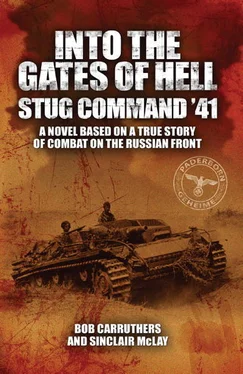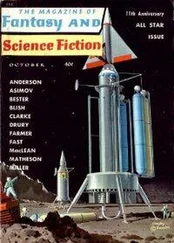The grim battle they had just encountered at Brest-Litovsk had contradicted the essential message of every briefing he had ever attended. This was not some unbalanced, rotten civilization, which, once the door had been kicked down, would fall at their feet. These men, women and children were a brave, stubborn and resolute adversary. This was no last gasp of a rotten regime, but a people who would fight to their own last dying breath…
As the Sturmgeschütze drove into the distance, the occasional sound of small-arms fire continued to resound from tiny centres of resistance in individual sectors of the citadel and the Kobrin fortification. They continued from late June until the very end of July. Even then, rifle fire and short bursts of machine-gun fire continued to ring out from basements and half-destroyed casemates as small groups of soldiers continued their lonely struggle. When the groups were all gone, solitary fighters still battled bravely on. Even though they were starving and covered with wounds, they asked no mercy, nor sought to give themselves up. No one knows when the very last shot was fired in the fortress, who the last defenders were, or how they died.
About Ritter von Krauss
RITTER VON Krauss is the pen name of a former German army officer who was the author of a large number of manuscripts for novels based on his experiences as a tank man in the first and second world wars. Although von Krauss is not his real name, the literal translation, Knight of the Cross , has been widely interpreted as an indicator that the author is a Knight’s Cross holder, gained as a result of his service in either the Wehrmacht Heer or the Waffen SS. There are at least forty surviving von Krauss novels in manuscript form, all of which are thought to have been written between 1954 and 1968, during the time when the author is believed to have lived and worked in Argentina. They range from fully-fledged novellas to story outlines a few thousand words long.
In 1990’s, during the negotiations for the sale of the rights to the novels, the manuscripts and the supporting documentation, as part of an extensive legal due diligence exercise, were studied and verified by a number of experts. This allowed the sale to proceed, but with the strict stipulation that the author should not be identified and that no publication could take place during the lifetime of any of the author’s children. In consequence of this condition, the manuscripts went unpublished in the 20th century.
The main barrier to publication during the author’s life time was a legal challenge by the author’s estranged children, based on the legitimate fear that the family might be identified and associated with von Krauss, who is reputed to have been active behind the scenes in the movement which became the Hilfsgemeinschaft auf Gegenseitigkeit der Angehörigen der ehemaligen Waffen-SS , the campaign to restore pension and other legal rights to Waffen SS veterans. His work in this sphere was strongly disapproved off by his family and, as a consequence, the publishing contracts contain strong non-disclosure clauses, preventing the publishers from identifying the author or commenting on his identity.
Following the death of the last of von Krauss’ children, the way for publication was finally cleared and Tiger Command! , the first published Ritter von Krauss novel, appeared in e-book form in 2011. The film Steel Tempest , which was based on von Krauss’ experiences in the Ardennes offensive, also appeared in 2011, with the author properly credited for the first time.
Ritter von Krauss was thought to have served in the Great War, where he was rumoured to have briefly been part of the unit which drove the A7V, the first of the German tanks, into battle. During the early years of the war, von Krauss is believed to have served as a motorcycle despatch rider and to have been an associate of Kurt Ludecke, who was later to emerge as a member of Hitler’s inner circle. It has also been widely speculated that he was on good terms with Sepp Dietrich.
He is known to have been descended from an aristocratic family and suffered the humiliation of being reduced to poverty in the 1920’s, when hyper-inflation wiped out the fortunes of both von Krauss personally, and the entire family. Following the Great War, von Krauss is thought to have served in the Freikorps and to have spent time in Russia, working on tank development at KAMA.
It is thought that his failure to find a place in the 100,000 man army of the Weimar Republic was the spur which led to his joining the Nazi party. It is also understood that von Krauss spent time in the SA, where he knew Ernst Röhm, as a result of an introduction by Ludecke. This is borne out by the fact that both Ludecke and Röhm appear in fictionalised form in the von Krauss manuscript Freikorps !
There are many references which are interpreted as being autobiographical and it is conjectured that, as a result of his experiences in the hungry twenties, von Krauss may have become a committed National Socialist and, in any event, undoubtedly harboured lifelong Nationalist aspirations. He was obviously a strong supporter of the Grossdeutschland vision that led to the creation of The Third Reich. He may therefore have been an obvious and easy convert to National Socialism, however, von Krauss was clearly not an anti-Semite and his novels display no trace of this aspect of National Socialist policy. In common with Ludecke and many others, von Krauss appears to assume that the anti-Semitic aspects of the party manifesto were a sideshow to the main event, which was the unification of the German speaking peoples into a Socialist state.
During the 1920’s, von Krauss is thought to have come to a breach with Ludecke when a number of business ventures designed to revive the von Krauss family fortunes also came to grief, leaving von Krauss penniless. It is thought that this was the event which drove von Krauss to seek employment by joining the fledgling SS, although he was initially highly disparaging of this outfit, describing himself as nothing more than “a glorified advertising salesman.”
It has been speculated that von Krauss joined Hitler’s regiment of bodyguards, the SS Leibstandarte , in 1933. From the subject matter of many of his novels, it is also thought that von Krauss served throughout the war initially as an armoured car commander and later as a Tiger tank commander, either in the Waffen SS or the Heer, or possibly both. The Gross Deutschland division has also been suggested as a possibility.
In 1945 von Krauss is understood to have escaped capture by the Russians and also to have slipped out of a British POW camp. As a result, he was never officially de-Nazified and, lacking the appropriate papers, he was unable to work in Germany and so began a game of cat and mouse with the German authorities that saw him serve briefly in the ranks of The French Foreign Legion, from which he was invalided out, suffering from malaria, an illness from which he never fully recovered.
Notes on the Translation and Sources
It is never an easy task to render the thoughts of a writer from his native language into a secondary language, and one has to be careful to guard against creating a new work. Unfortunately, it is not possible to provide a complete translation of every word of the original manuscript. However, I feel it was important to preserve the essence of the German roots of the novel. I have preserved the original chapter headings and a larger than usual number of German words, which are hopefully sufficient to make it clear at all times that we are in a foreign army. This is especially true of the ranks of the political soldiers of the Waffen SS. I’d like to think the balance is about right, but please accept my apologies if you have to reach for the German dictionary more than you would like.
Читать дальше












